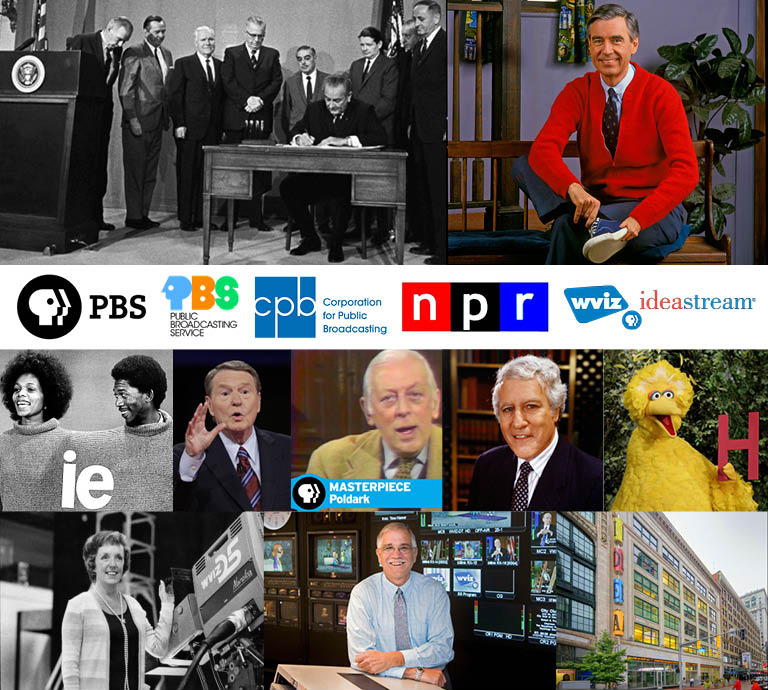“It’s A Beautiful Day in the Neighborhood”

(top row l to r) President Lyndon B. Johnson signing the Public Broadcasting Act of 1967; Mr. Rogers putting on his sneakers. (second row) National logos and our own WVIZ Cleveland logo. (third row l to r) Early years: Rita Moreno and Morgan Freeman on the Electric Company; Jim Lehrer; Alistair Cooke; Louis Rukeyser; Big Bird. (bottom row l to r) Betty Cope, founding president of WVIZ Channel 25 in Cleveland retired in 1993; The next face of the station, Kent Geist, retired in 2014 after 46 years; Current home to WVIZ-TV and WCPN radio in the Idea Center at Playhouse Square.
Like many of you I’m guessing, I took some time the other night and decided to watch our President’s first address to Congress. I grabbed the remote and flipped around the different stations, eventually landing on our local PBS station – (I figured they would likely be the most neutral of the bunch on the commentary side). Sure enough, the “talking heads” were focused on the event, the news, the history and more of the educational/informational side. It got me to thinking about public television broadcasting in general and the great shows I watched and enjoyed as a kid. So, I did a little digging to see what I could find and share. Like so many of my searches, I ended up uncovering some really interesting info about public tv, public radio and educational broadcasting in general – all of which I’d never be able to uncover without the help of my trusty computer, the Corporation for Public Broadcasting (cpb.org) and Wikipedia. Come to find out, it’s almost 50 years since the Public Broadcasting Act was signed into law by President Johnson back in 1967, eventually bringing us great children’s programming, music and concerts, comedy, and investigative reporting specials. Rather than try and list everything, I thought I’d share President Johnson’s remarks, outlining his vision and hope for television education and knowledge sharing across the nation. If you want more info on the CPB, click HERE After reading President Johnson’s remarks take a moment to ponder how prophetic he actually was! Enjoy.
… It was in 1844 that Congress authorized $30,000 for the first telegraph line between Washington and Baltimore. Soon afterward, Samuel Morse sent a stream of dots and dashes over that line to a friend who was waiting. His message was brief and prophetic and it read: “What hath God wrought?”
Every one of us should feel the same awe and wonderment here today. For today, miracles in communication are our daily routine. Every minute, billions of telegraph messages chatter around the world. They interrupt law enforcement conferences and discussions of morality. Billions of signals rush over the ocean floor and fly above the clouds. Radio and television fill the air with sound. Satellites hurl messages thousands of miles in a matter of seconds.
Today our problem is not making miracles–but managing miracles. We might well ponder a different question: What hath man wrought–and how will man use his inventions? The law that I will sign shortly offers one answer to that question.
It announces to the world that our Nation wants more than just material wealth; our Nation wants more than a “chicken in every pot.” We in America have an appetite for excellence, too. While we work every day to produce new goods and to create new wealth, we want most of all to enrich man’s spirit. That is the purpose of this act.
It will give a wider and, I think, stronger voice to educational radio and television by providing new funds for broadcast facilities. It will launch a major study of television’s use in the Nation’s classrooms and their potential use throughout the world. Finally–and most important–it builds a new institution: the Corporation for Public Broadcasting.
The Corporation will assist stations and producers who aim for the best in broadcasting good music, in broadcasting exciting plays, and in broadcasting reports on the whole fascinating range of human activity. It will try to prove that what educates can also be exciting.
It will get part of its support from our Government. But it will be carefully guarded from Government or from party control. It will be free, and it will be independent–and it will belong to all of our people.
Television is still a young invention. But we have learned already that it has immense–even revolutionary–power to change, to change our lives.
I hope that those who lead the Corporation will direct that power toward the great and not the trivial purposes. At its best, public television would help make our Nation a replica of the old Greek marketplace, where public affairs took place in view of all the citizens. But in weak or even in irresponsible hands, it could generate controversy without understanding; it could mislead as well as teach; it could appeal to passions rather than to reason.
If public television is to fulfill our hopes, then the Corporation must be representative, it must be responsible–and it must be long on enlightened leadership. I intend to search this Nation to find men that I can nominate, men and women of outstanding ability, to this board of directors…
… What hath man wrought? And how will man use his miracles? The answer just begins with public broadcasting.
In 1862, the Morrill Act set aside lands in every State–lands which belonged to the people–and it set them aside in order to build the land-grant colleges of the Nation. So today we rededicate a part of the airwaves–which belong to all the people–and we dedicate them for the enlightenment of all the people.
I believe the time has come to stake another claim in the name of all the people, stake a claim based upon the combined resources of communications. I believe the time has come to enlist the computer and the satellite, as well as television and radio, and to enlist them in the cause of education.
If we are up to the obligations of the next century and if we are to be proud of the next century as we are of the past two centuries, we have got to quit talking so much about what has happened in the past two centuries and start talking about what is going to happen in the next century beginning in 1976.
So I think we must consider new ways to build a great network for knowledge–not just a broadcast system, but one that employs every means of sending and storing information that the individual can use.
Think of the lives that this would change:–the student in a small college could tap the resources of a great university –The country doctor getting help from a distant laboratory or a teaching hospital; –a scholar in Atlanta might draw instantly on a library in New York; –a famous teacher could reach with ideas and inspirations into some far-off classroom, so that no child need be neglected.
Eventually, I think this electronic knowledge bank could be as valuable as the Federal Reserve Bank. And such a system could involve other nations, too–it could involve them in a partnership to share knowledge and to thus enrich all mankind. A wild and visionary idea? Not at all. Yesterday’s strangest dreams are today’s headlines and change is getting swifter every moment.
I have already asked my advisers to begin to explore the possibility of a network for knowledge–and then to draw up a suggested blueprint for it.
In 1844, when Henry Thoreau heard about Mr. Morse’s telegraph, he made his sour comment about the race for faster communication. “Perchance,” he warned, “the first news which will leak through into the broad, flapping American ear will be that Princess Adelaide has the whooping cough.”
We do have skeptic comments on occasions. But I don’t want you to be that skeptic. I do believe that we have important things to say to one another–and we have the wisdom to match our technical genius. In that spirit this morning, I have asked you to come here and be participants with me in this great movement for the next century, the Public Broadcasting Act of 1967… President Johnson went on to recognize those who worked on the act.
Thanks to the Lyndon Baines Johnson Library for archiving the text of President Johnson’s remarks.



Leave a Reply
Want to join the discussion?Feel free to contribute!